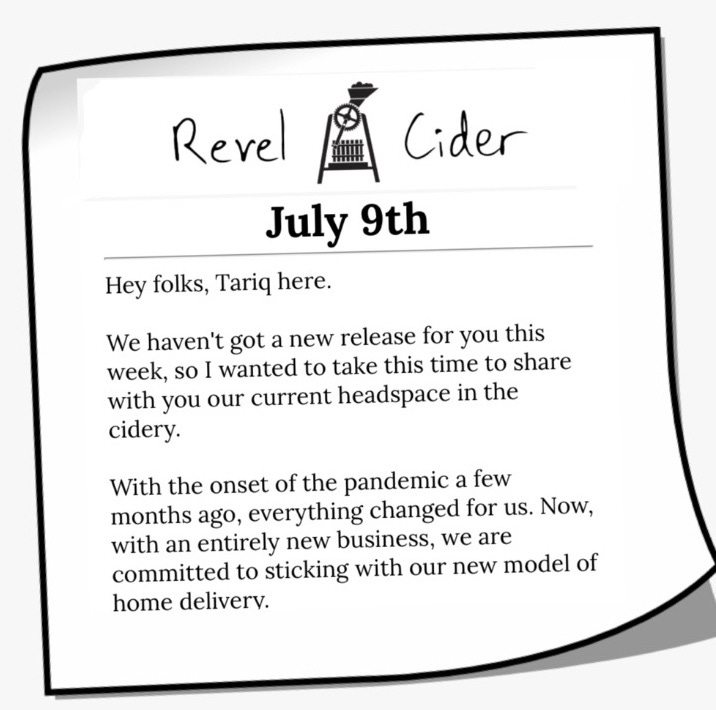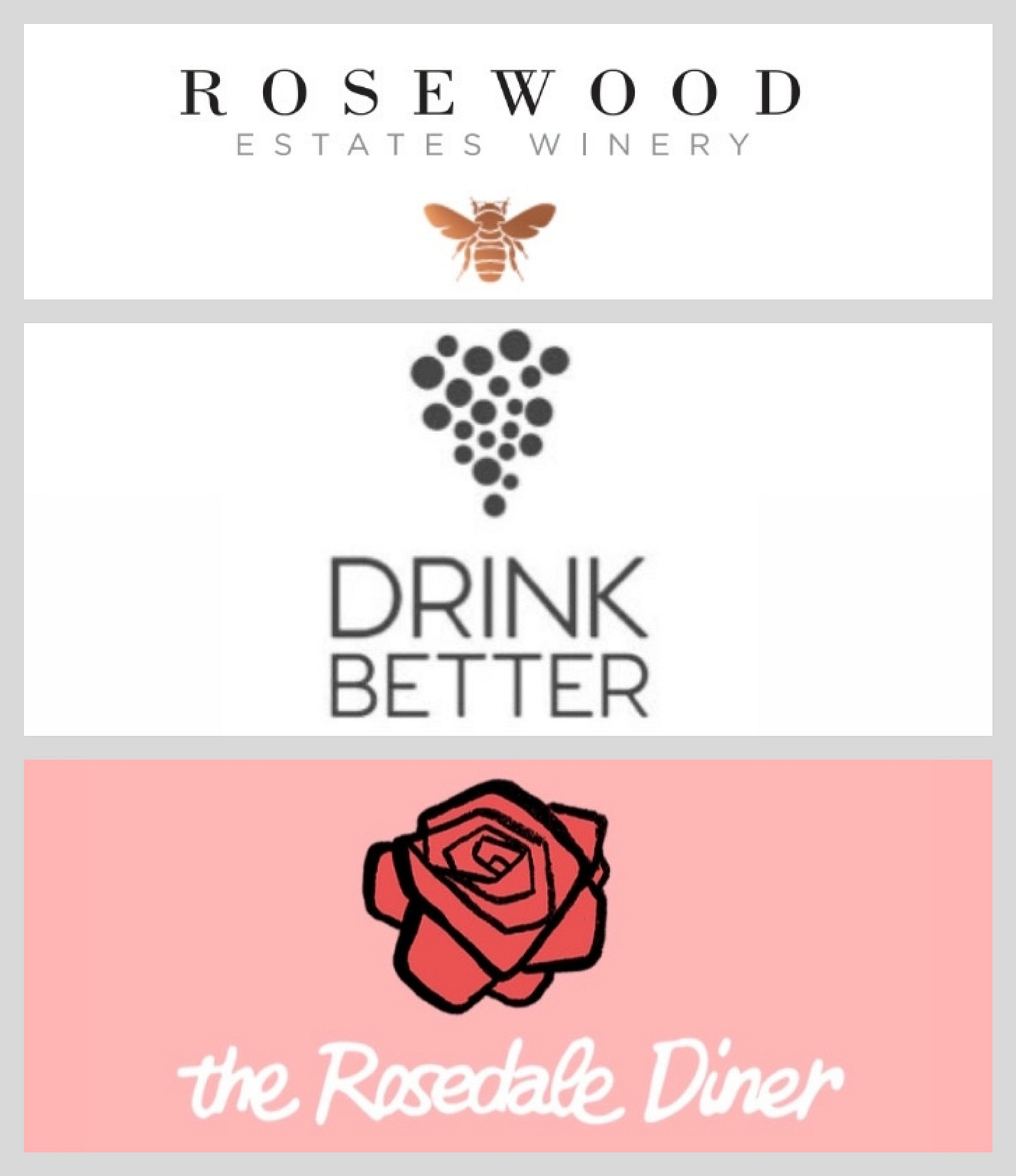The Pandemic's Impact on Local Wine Businesses
A roundtable-ish discussion about changes in Ontario’s wine marketplace
In Revel Cider’s July 9th newsletter, founder and cider maker Tariq wrote:
With the onset of the pandemic a few months ago, everything changed for us. Now, with an entirely new business, we are committed to sticking with our new model of home delivery…. We are truly enjoying the ability to connect directly with each of you, and it has become clear to us that this is a much more sustainable model than before.
Tariq wrote about changes at Revel Cider, including new hires, improving the on-site retail store experience, and their donation initiatives.

It got me thinking about how other small Ontario wine businesses have adjusted to the pandemic, and how that has impacted the wine marketplace. To get a cross-section of perspectives and experiences, I chatted with a winery (Rosewood), an importer (Drink Better), and a restaurant-turned-bottle-shop (The Rosedale Diner). Excerpts from our conversations follow (edited for length and clarity).

How has the pandemic impacted and/or changed your business?
Rosewood Winery: It changed everything, and it will continue to shape how business is done for us for a long time. We closed our retail shop on March 15th and within a week pivoted entirely to online sales through our website, but weren't quite ready for how many orders we would get. Thankfully our website was already optimized for online sales, but the logistical and shipping side of our business went from something easily managed to a full time job.
Drink Better: In the beginning of the pandemic our biggest issue was that we didn't have any wine to sell so couldn't respond to any demand that was there after the New Year lull. As a newer agency that just joined the consignment program in January of this year, we had just been granted warehouse space and were waiting for orders. We ordered a lot of wine in Jan/Feb, and then COVID hit in March, so there were massive delays in customs, and we couldn’t predict the timing of when our wine would get to the warehouse. While we were waiting, we spent some time working on our website, and shifting our focus to direct-to-consumer sales. I also normally travel to different wine regions and fairs, but those trips are obviously on hold for now. While travel is great to be able to connect with winemakers in their own backyards — there is no substitute for that and I miss that human connection — this is only temporary, and I'm thankfully still able to taste and get new wine into our portfolio.
Rosedale Diner: It’s impacted it a ton! In order to ensure safety for both customers and employees, it’s eliminated many aspects of intimate service. Luckily we have outdoor space, so we can still try to manage a bit of in-house service. In regards to whether or not the wine sales have changed, absolutely. The bottle shop aspect has been a game-changer, as has the benefit of an online shop. We wouldn’t be in business if we didn’t have the selection we have and a way to sell and distribute it.
Has it changed how you interact with customers?
RW: For the first few months, almost all interactions were through the phone or over email. Lots of guests were skeptical about ordering wine online, so we got good at describing flavours and styles without the experience of sharing a taste with a guest. Now that we have re-opened the shop, with staff wearing face masks and protected by plexiglass, trying to mediate those interactions has been challenging — how do you convey a 'faceless welcome' to a guest if they can only see your eyes — but it's nice to have some life back at the winery after several quiet months.
DB: We have not been able to taste and meet with our customers, which was a big adjustment. We are working with them in different ways now, paying close attention to what they need as they work to adjust their businesses to the different phases of reopening. And we have been working to build that same kind of rapport and level of service that we have with our restaurant customers, with our new private customers (individual consumers), that we have gained during the pandemic.
RD: Customers seem to love it. Those who are looking for alternatives to the LCBO come for more diverse, less mainstream selections. The customer interactions are now a hodgepodge of sit-down service (with a few alterations) and bottle shop stop-ins and online sales.
How have the government measures helped you?
RW: We unfortunately had to lay off some of our part-time/hourly staff, and they took advantage of CERB and CERN until we could bring them back into the fold; but otherwise we did not take advantage of any government mitigation efforts. We benefited indirectly from restaurants pivoting to 'market' models, or allowing wine to be purchased and taken home.
DB: Mixed cases have been great for us, especially with the producers we have. For example with Judith Beck, a smaller producer in Austria, we have been able to offer a mixed pack featuring six different bottles of her wines. Judith was excited for customers to be able to get a sense of who she is with these wines, and we are seeing that the opportunity to try a variety of wines has been enticing to customers.
RD: The federal measures have been 100% necessary in keeping us alive, and the wine and beer takeout has been invaluable.
How do you think the pandemic has changed the landscape of Ontario's wine industry?
RW: I think all the 'behind the scenes' activity (the majority of what we do - farming and growing grapes, picking and harvest, fermenting and aging and bottling) will remain essentially the same. Farming waits for no one, grapes are going to grow and need to be tended, harvested, and coaxed into becoming wine regardless of what else is going on in the world. But the guest facing side of the business needs to change, hospitality in general needs to change. There are 100+ wineries in the Niagara Region and the experience has basically been the same for a long time: Show up, look at a tasting menu, select wines to try, listen to a tasting bar server explain the wines, buy a bottle, and on to the next one. I think the pandemic has thrown everyone for a loop, because how do you continue to offer that same experience with safety precautions and distancing in place? This pandemic will force everyone to re-evaluate what kinds of experiences they offer, and ultimately how to chart your own path that might be new and different from the norm.
DB: Ontario wineries and cideries did a really good job of letting people know they were there for them, and it's so nice to see more people discovering local products. I've also enjoyed watching the change in the retail experience — and the deep expertise at some of these bottle shops, with in-store sommeliers and other knowledgeable staff, sharing stories about the producers and the wines they’ve chosen— it feels like some of the European wine shops. I hope the bottle shops stay post-pandemic, but we need wholesale pricing for it to continue permanently.
RD: I think it’s too soon to tell, but I hope we can retain this level of free-market interaction with customers. As a restaurateur, having exclusive product is essential, and I want to support local as much as possible — having that avenue to sell a local winery’s products through the bottle shop is, I hope, helpful for both us and the winery.
The pandemic has exposed many issues — ie. the vulnerability of the hospitality industry, inequality, and standing up for societal issues — how has this impacted you?
RW: It shouldn't have taken a pandemic and newspaper headlines for the wine/beverage/hospitality industry to wake up and get the message, but it seems to have sparked a catalyst and hopefully leads to meaningful change across the industry. Hospitality is about putting yourself aside and focusing all your energy into the service and well-being of your guests. We have taken the time to speak internally at length about our practices and what we can do to ensure that BIPOC (Black, Indigenous and People of Colour) guests feel more welcome at the winery, and to commit to changing our hiring practices, and consider how all decisions made at the winery affect the diverse communities we interact with. We donated to the Black Legal Action Centre, Black Health Alliance, and BLM Toronto, in addition to supporting the Toronto Restaurant Workers Relief Fund (spearheaded by the amazing Arianne Persaud).
DB: We are currently working with another small wine agency — Bespoke, and Niagara College — on ways to increase the number of BIPOC winemakers in Ontario through bursaries and a scholarship fund. This is how we want to contribute to the industry — by helping to create opportunity for new faces and voices in local wineries. We donated a portion of June and July sales to the Toronto Restaurant Workers Relief Fund and the Black Legal Action Centre. Based on recent events we are also more carefully choosing the restaurants we work with and where our producers' wines appear. It's essential for us in living our values that we apply the same consideration we do for selecting wine producers, to selecting restaurants that mirror those values... in not only the way they source their ingredients but in the way they treat their teams. We are also working with our current list of producers on ways to communicate the transparency in their labour practices. We cannot accept that exploitation and harm continues in any part of this business. We will make mistakes in our work on this — and that is how we'll learn and improve.
RD: I believe these issues absolutely need to be addressed: the vulnerability of both employers and employees, rampant misogyny, sexism and racism within the food industry… I hope that a more focused eye on all that comes out of this.
Thank you Kari Macknight Dearborn at Drink Better, Matt Finn at Rosewood Estates Winery, and Gil Filar at The Rosedale Diner for taking the time to share your experiences and insights about the pandemic and wine.


